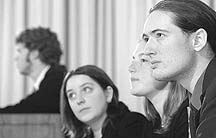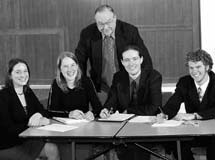There’s no debate: Forensics Team excels

The parliamentary debaters of Lewis & Clark’s Forensics Team can. In fact, they’re among the best in the nation at that kind of challenge, coming up sixth out of more than 300 schools in the National Parliamentary Debate Association’s annual ranking of college and university squads. It was the first time Lewis & Clark has come so close to the top in parliamentary debate.
The rankings are based on the team’s performance at debate tournaments throughout the season. At the weekend competitions, debaters compete in two-person teams, in either parliamentary or policy events. The two styles, explains Coach Steve Hunt, are very different.
“Parliamentary debate is more extemporaneous,” says Hunt, who is also a professor of communication. “You get a different topic every round, and you only have 15 minutes to prepare your case, so you rely on your knowledge of current events.” Consequently, most parliamentary debaters are news junkies, and really serious competitors also do in-depth research on issues they predict will be hot competition topics.
Policy debaters, on the other hand, receive their topic at the beginning of the season (this year it was federal policy toward Native Americans) and research and debate that topic all year long. At a competition, you can recognize policy debaters by the big tubs they lug from round to round, filled with meticulously researched evidence files. Debaters also compete in individual events, including impromptu speaking, persuasive speaking, and oral interpretation.
Policy debate is the most time-consuming, but all debaters find themselves making a serious time commitment to the activity. “People who don’t do debate can’t quite understand why we let it so dominate our lives,” says team member Kit Shelton ’04. “It really is addictive.” In addition to attending weekly team meetings, most debaters practice several times a week in sessions that last anywhere from one to four hours or more. Debaters can earn up 4 semester credits for their participation.
While Lewis & Clark’s policy squad made a respectable showing and a number of team members, most notably Karissa Dunbar ’03, excelled in individual events, the parliamentary debaters were the stars this year. And while their stellar national ranking went largely unnoticed on campus, team members say they don’t really mind.
“Forensics doesn’t get a great deal of attention, usually,” says Hunt, who after 29 years of coaching is used to the lack of fanfare. “But there are many rewards. Out of seven people elected as juniors to Phi Beta Kappa this year, three have been or are debaters, which is a pretty good percentage. Seeing students doing well, showing signs of intellectual genius —that is a nice thing. When they go on to successful careers in teaching, law, or business—that is a nice thing, too.”
This year’s parliamentary debaters are young compared to the nation’s other top squads, and members have high hopes for an even better season next year. “I think we have a shot at the top spot,” says Keith West ’04, one of the team’s top performers. “Our strongest teams this year were almost all first- and second-year students, so we’ll all be back.”
Proud coach insists on academic excellence
Ask the members of Lewis & Clark’s forensics team to describe Steve Hunt, and you’ll get pretty consistent answers. “He knows everything about everything that’s going on in the world.” “He’s this incredible fount of knowledge.” “He’s like a walking reference book.”

“I am a fanatic about current events,” admits Hunt, whose reading list includes Time, Newsweek, U.S. News & World Report, the New York Times, the Oregonian, the Economist, andCongressional Digest. He also finds time for nightly television news and “Washington Week in Review.” “It’s part of my job to try and keep up with that sort of thing.”
Hunt’s job for the last 29 years has been serving as head coach of the forensics team, as well as a professor in the College’s Department of Communication. His duties, says Hunt, consist of being “an administrator, a publicist, a coach, a chauffeur, and a ticket agent. Then I have to do my regular stuff—teaching and service to the department as well as scholarship. It’s an especially arduous and difficult job, but also a rewarding one.”
Debate can be an arduous activity for students as well, but Hunt makes sure it doesn’t interfere too much with team members’ studies. While tournaments are held almost every weekend during the September-through-April debate season, Hunt discourages Lewis & Clark debaters from attending more than two in a row.
“Academics must come first,” Hunt insists. “They have to stay in contact with their professors, they can’t miss too many classes to attend tournaments, and they have to keep up with the work. Fortunately, good debaters are good planners and time managers. And of course, they’re very bright.”
Giving those bright students an opportunity to shine is at the heart of his coaching philosophy. “I try to challenge them, make them struggle, make them aspire to higher levels. Those experiences will shape and mold them,” he explains. “They’ll be thinking critically, organizing material, presenting ideas, and getting evaluated by others. Those are fundamental experiences that will help them in anything they do throughout their lives.”
—by Kristin Tranquada
More L&C Magazine Stories
Lewis & Clark Magazine is located in McAfee on the Undergraduate Campus.
MSC: 19
email magazine@lclark.edu
voice 503-768-7970
fax 503-768-7969
The L&C Magazine staff welcomes letters and emails from readers about topics covered in the magazine. Correspondence must include your name and location and may be edited.
Lewis & Clark Magazine
Lewis & Clark
615 S. Palatine Hill Road MSC 19
Portland OR 97219

